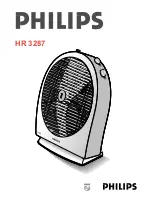
airflow across the room (e.g. opposite the
internal doorway).
•
Near the source of steam or odours.
•
Not where ambient temperatures are likely
to exceed 50˚C.
•
If installed in a kitchen fans must not be
mounted immediately above a cooker hob,
or eye level grill.
•
If installing in a room containing a fuel
burning device which has a non-balanced
flue, it is the installer's responsibility to
ensure that there is enough replacement
air to prevent fumes being drawn down the
flue when the fan is operating up to
maximum extract.
Refer to Building Regulations for specific
requirements.
•
Exhaust air must not be discharged into a
flue used for exhausting of fumes from
appliances supplied with energy other than
electric. Requirements of all authorities
concerned must be observed for exhaust
air discharge and intake flow rates.
•
When intended for use in possible
chemical corrosive atmospheres, consult
out Technical Service Department. (For
overseas markets contact your local
Xpelair distributor).
•
DX100PIR Only - Siting must ensure
detection of movement. Care should be
taken to avoid obstruction that may affect
detection beams
A
.
Installing the isolating switch and cables
1. Check that the electrical rating shown inside
the back plate matches your mains supply.
2. Check there are no buried pipes or cables
e.g. electricity, gas, water behind the switch
location (in the wall or above the ceiling).
If in doubt, seek professional advise.
3. Isolate the mains supply.
4. Lay in the cable from the isolating switch to
the fan location via the on/off switch
(if required).
5. Lay in the cable from the isolating switch to
the point of connection to the mains supply.
6. Install the isolating switch and on/off switch
(if required).
7. Make all connections within the isolating
switch and the on/off switch (if required).
Note: on/off switch must be situated so that it
cannot be touched by persons making use of
the bath or shower.
WARNING : DO NOT MAKE ANY
CONNECTIONS TO THE ELECTRICAL
SUPPLY AT THIS STAGE.
For Australia only (DX100, DX100PC. DX100HP &
DX100PIR)
Connection to the supply can be made by a
5
flexible 2-core cable complete with 3 pin plug for
insertion into an approved 10 amp GPO or
directly wired through an approved 10A wall-
mounted surface switch with at least 3mm
clearance between contacts.
For Australia only (DX100T, DX100H & DX100VTD)
These models are permanently connected to the
supply and operation is controlled by a remote
switch. They should be directly wired to the
supply through an approved 10amp wall mounted
surface switch with at least 3mm clearance
between contacts.
WARNING : CHILDREN SHOULD NOT PLAY WITH
THE APPLIANCE AND ENSURE THAT YOUNG
CHILDREN AND THE INFIRM ARE SUPERVISED
Preparing the hole
If working above ground floor level,
appropriate safety precautions must be
observed.
WARNING: EYE PROTECTION MUST BE
WORN DURING ALL DRILLING AND
CHISELLING OPERATIONS.
If installing in a wall
1. Check there are no buried pipes or cables
in the wall or obstructions on the outside
e.g. electricity, gas, water.
If in doubt, seek professional advise.
2. Mark on the wall the centre of the duct hole.
3. Use this centre to mark a circle to suit the
wall duct (115mm diameter).
If core drill equipment is available:
4a. Use as directed by core drill manufacturer.
If core drill equipment is not available:
4b. Drill a centre hole right through the wall.
5. Cut the hole. Do not cut right through the
wall. (The recommended method is to drill a
series of holes, close together, around the
edge of the cutting line and remove the brick
between the holes with a chisel).
6. Go outside and cut a hole in the outer wall,
repeating the process described above.
7. Cut ducting to the correct length if required.
The wall tube supplied is telescopic and can
extend to 300mm maximum.
8. Fit the ducting. Ensure that the duct slopes
down away from the fan to allow drainage of
any incoming rain water to the outside.
9. Make good the hole. Allow the mortar to set
before continuing the fan installation.
If installing in a window or panel
1. Cut a hole, 125mm in diameter or if installing
in a window, obtain a ready cut pane.
2. The centre of the hole should be at least
110mm away from the edge of the panel or
pane of glass.
If installing in a ventilation shaft
1. Check there are no buried pipes or cables
in the ventilation shaft.
If in doubt, seek professional advise.
2. Cut a hole 110mm in diameter, in the side of
the shaft.
Содержание DX100
Страница 2: ...2 A B D E F G C DX100PIR 1 2 5 m m 1 1 5 m m...
Страница 3: ...H 3 I J K DX100T DX100PIR DX100H DX100HP L...

























